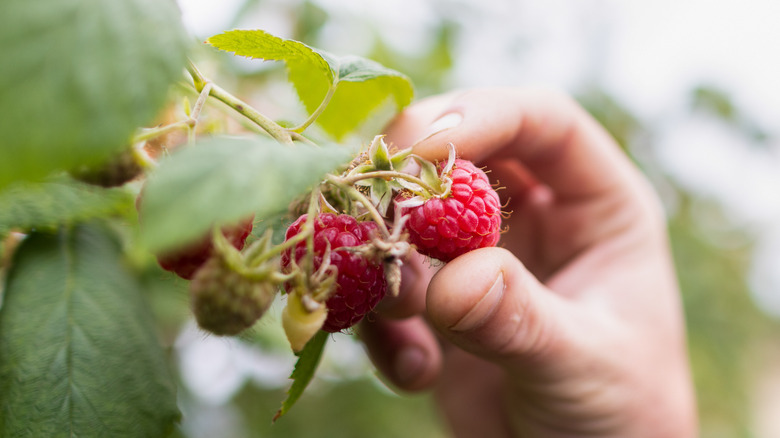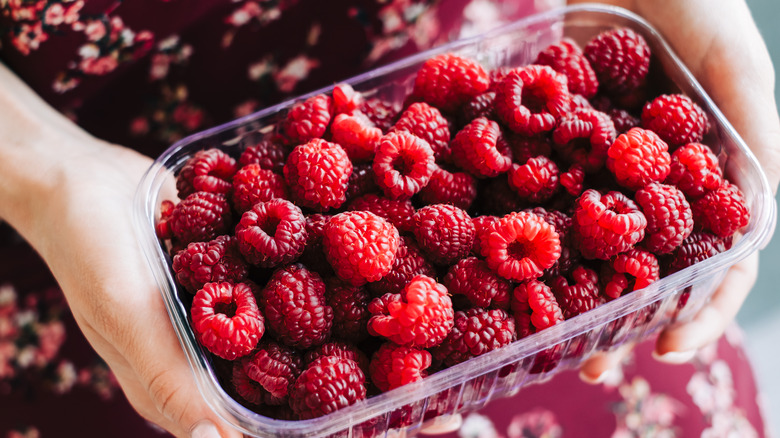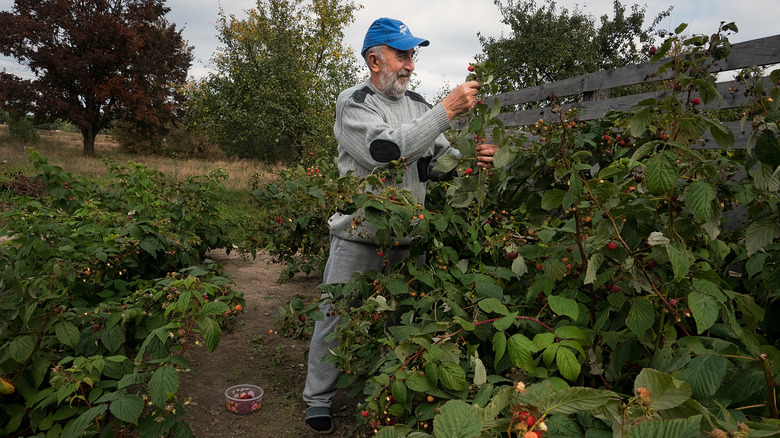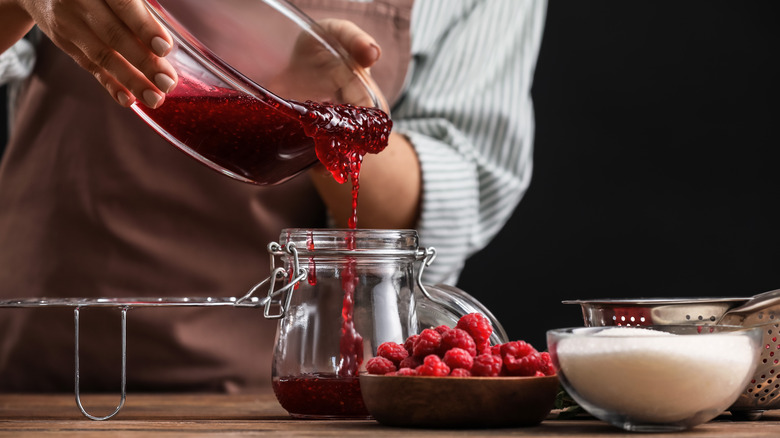Most Of The World's Raspberries Come From This Country
To our annual chagrin, fruit is not in season year-round. Sure, greenhouse farming is available, and stores will almost always keep our favorite fruits like apples, watermelons, and bananas stocked, but by mid-December, we're all waiting with bated breath for spring to come again and bring with it the ripest, sweetest produce. We crave summer favorites like peaches, apricots, figs, and cherries. Blackberries cap our season of fruitfulness, but for many of us, raspberries are the star.
According to Britannica, the raspberry is a fruit from the Rosaceae family which means it's related to the rose. Raspberries grow throughout northern Europe and North America as well as in East Asia. They are known for their sweet, acidic flavor and are most commonly eaten fresh or turned into delicious jams and jellies. They are quite a popular fruit worldwide, but a country particularly fond of them is Russia, where the Food and Agriculture Organization says that most raspberries in the world are grown.
Russian raspberries reign
Russia is actually quite a successful fruit-producing country, despite its reputation as a frozen tundra. In reality, during its warm season, Russia grows sweet cherries, strawberries, apples, pears, plums, apricots, grapes, melons, and peaches. Despite that, the amount of fruit grown does not meet domestic demand, and Russians often end up importing more (via Russian-Farmland). Raspberries are just one of the many crops Russia grows, and in 2020 alone, Science Agriculture reports that the northern country produced 182,000 tons of the fruit. Mexico followed behind Russia by growing 146,350 tons, and Poland came in third with 121,700 tons. The Helgi Library says that in 2019 Russia accounted for 21.2 % of global raspberry production and ended up exporting 519 tons of raspberries, blackberries, and mulberries to other countries (via Selina Wamucii).
As most of us are painfully aware, soft fruits like raspberries have an extremely short shelf life. This makes shipping the fruit out of the country extremely difficult, in addition to the fact that harvesting the fruit is a harrowing process. According to North Carolina State University, raspberries can't be picked unless they are completely ripe, dry, and clean. Because they are so delicate, harvesting raspberries for mass production in Russia is difficult. They are commonly hand-picked and are a labor-intensive fruit to farm, though the demand for the fruit continues to grow (via Encyclopedia of Food Sciences and Nutrition).
Raspberry history
Raspberries spread pretty quickly throughout the world in comparison to some other plants, mainly because the brambles themselves are quite hardy. The Washington American's Raspberries claims that the red raspberry (Rubus idaeus) in particular is believed to be native to Asia Minor, while other variants originated in North America. They, like many other fruits in ancient civilizations, were regarded as medicinal as well as delicious, and their juices were actually used for dyes and paints, though only the wealthy could afford them.
According to the Wisconsin Department of Public Instruction, raspberries were eventually spread throughout the Mediterranean. When the Romans did as Romans do and conquered most of Europe, they brought raspberries with them, introducing the fruit to the British Isles. Raspberries thrived in the Northern Hemisphere because they prefer growing through cool summers. When Europeans colonized the Americas, they discovered the black raspberry, but having a preference for the red varietal, the British began shipping the red fruit to New York in 1771. George Washington himself admired the fruit so much that he ended up growing over 40 different kinds of raspberries at Mount Vernon (via Delishably).
Raspberry recipes and more!
Red-colored fruit simply screams summer, doesn't it? Glossy cherries, shiny strawberries, and of course the textural and flavorful delight of raspberries. As with all fruits, there are quite a few benefits to eating fresh raspberries. BBC Good Food claims that raspberries may help manage blood sugar levels, protect against cancer with their plentiful antioxidants, and are believed to even aid arthritis pains. The site even reports that since the fruit is rich in polyphenols, raspberries may help a person age gracefully and will improve overall balance and strength. The power of raspberries, right?!
But besides health benefits, raspberries are good for so many other things, including desserts. My Food and Family report that these sweet and sour fruits reach peak harvest season between June and August which makes summer the perfect time of year to try baking some of our favorite raspberry desserts including raspberry coconut cake, raspberry cheesecake, raspberry cinnamon rolls, and take the opportunity to make our own raspberry jam to give as holiday gifts a few months down the road.



